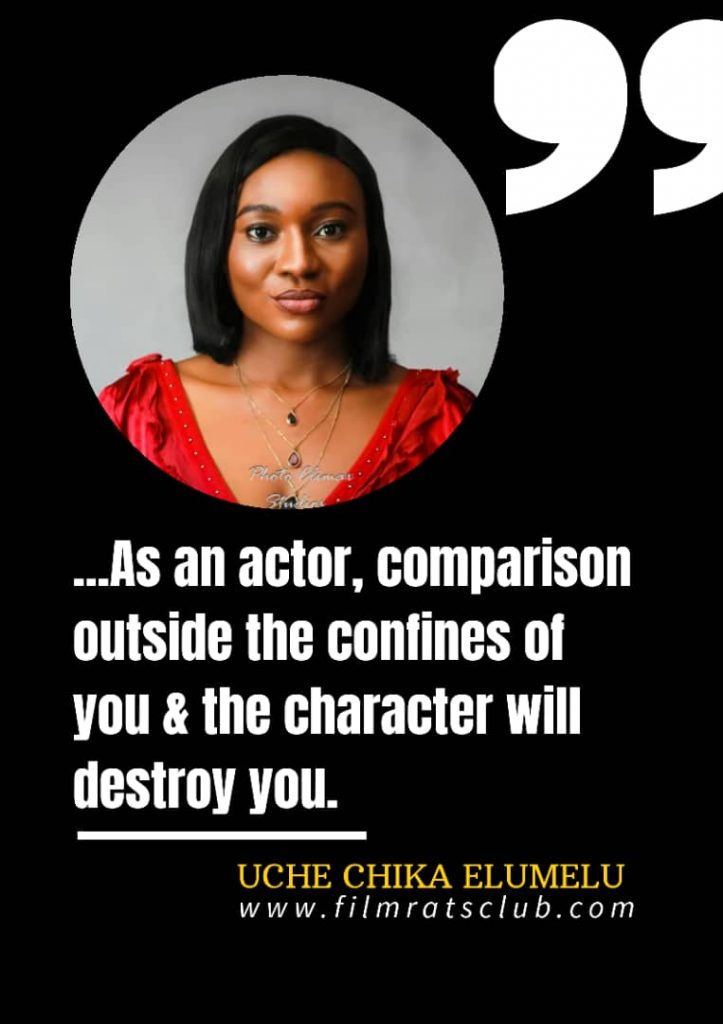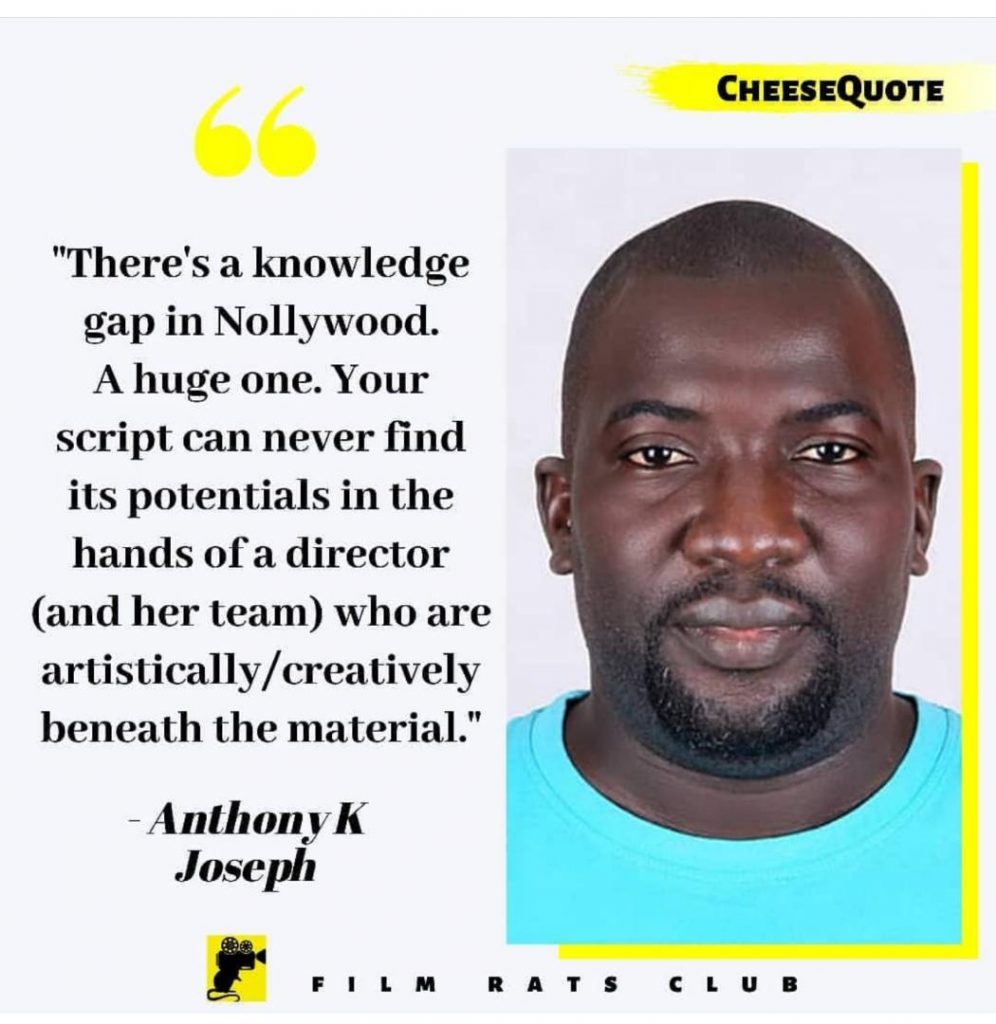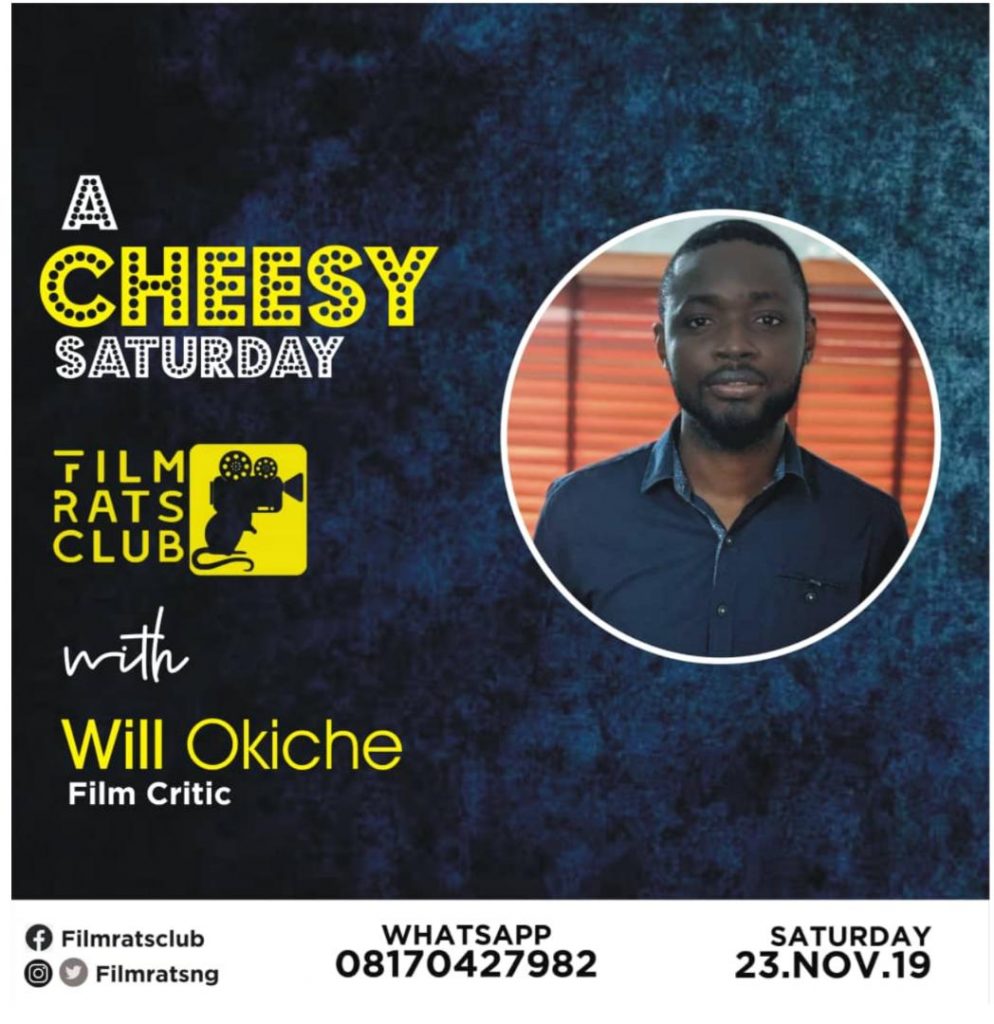Uche Chika Elumelu on respecting the Director’s Ultimate Eye.
The great Marlon Brando once said, an actor is at most poet and at least an entertainer. Regardless of where the pendulum swings, at different points in a career, as projects come and go, the actor’s mind remains a rich well of experiences. The Filmrats club strove for this when we latched onto the opportunity to interview the delectable Uche Chika Elumelu. Do enjoy the transcript of the discussion here: Folashade: How are you doing today? Uche Chika: I’m quite well, thank you. Good afternoon, folks. Folashade: How’s the quarantine and social distancing period been for you? Uche Chika: Restful! Gosh, it’s been really restful. Of course, my heart goes out to those who are more directly affected and pray for things to get back to normal as soon as possible Folashade: Amen, we are all affected in one way or another. Right, so let’s get to it, who is Uche Chika Elumelu? Uche Chika: Oooooh. You missed the chance to say, “Can we meet you, ma?” Folashade: Honestly, I was avoiding using that exact line. (They both share a laugh as our guest continues) Uche Chika: Uche Chika Elumelu is an intense being, performer of immense skill and family-oriented to the core. Folashade: Hmmm, okay, let me ask this one question that bugs a lot of Rats even if they don’t admit it. Are you in anyway related to Tony Elumelu? Uche Chika: He’s related to me. Folashade: *snaps fingers* Knew it! (Again they share that infectious virtual laugh) Uche Chika: Well, here’s the official statement – Uche Chika Elumelu is a performer of immense skill. Watching Africa Magic’s buzz-worthy telenovela, UNBROKEN, one would agree that her portrayal of the character “Kosi” is a delight. This comes barely a year after fans of the network fell in love with “Onyeje”; a character Elumelu plays on Africa Magic epic series, AJOCHE. Box office hit, SUGAR RUSH, and favorite web series, SGIT Season 6, are two of the major projects that shaped 2019 for the actor. During her time in Queen’s College, she was an active member and eventual President of the Drama Club. She graduated from the Department of Geography, University of Ibadan, with First Class Honours. Forging alliances with colleagues at the Department of Theatre Arts of the aforementioned institution, she continued to hone her creative skills by featuring in a wide range of student projects. Elumelu has worked with critically-acclaimed directors such as Felix Okolo, Kenneth Uphopho, Femi Elufowoju Jr. & Najite Dede. Her notable stage credits include Heartbeat the Musical, The Secret Lives of Baba Segi’s Wives and Legends the Musical. In addition to theatre practice, the 28 year-old is also a fitness buff; a skill she has found extremely useful in her craft. Folashade: Alright, I gather you have a degree in Geography and you graduated with honours, so how did we get here? Performing, I mean. Uche Chika: Interesting question. Geography was my favourite subject back at Queen’s College. But I wanted to study Theatre Arts. My family was skeptical so they asked me to choose another course. Geography was the next best thing. However, we struck a deal. I keep my grades up, they let me do theatre on the side. That was how I honed my skills. So you could say that my love for theatre drove me to excel in school. Folashade: Wow. There’s actually nothing like having your family’s support. The invincibility it portends is priceless. Okay, can you recall that ‘exact moment’ that you decided you wanted to be a PERFORMER? Uche Chika: That’s right. Family is everything and more. Frankly, I don’t remember having an “aha moment” in particular but I always loved being in church plays as a child. It made me feel like I could express my truest self in performance. I still feel that way. Folashade: You juggle screen and stage performances commendably well but which do you find yourself most comfortable in and which do you find most challenging? Uche Chika: Well, I’m a stage girl. I only ventured into screen because, let’s face it, it pays better. Way better. There’s something magical about live theatre that keeps you grounded. Screen, on the other hand, is challenging because CONTINUITY is a beech! But I’m learning to embrace both in equal measures. Balance is key in life. Folashade: Continuity is indeed a headache, especially when you have to repeat exact words and actions which, in my own point of view, tampers authenticity. So far, what’s the most challenging character you’ve had to play? Uche Chika: I will go with Queen Amina of Zazzau from Legends the Musical. I don’t think I’d ever pushed that hard in my career to deliver. So, the tricky thing was, someone else (a friend) played the character in the maiden edition. I felt I had to bring a fresh energy to it so I decided to learn the accent, bits of the language and dance like a warrior. Every bike man was my tutor. I would start before everyone else and go home last, just so I could do her justice. My existing fitness culture was a plus too. Thankfully, I got a lot of good reviews. But the hardest part was staying away from comparisons with my friend’s performance. As an actor, comparison outside the confines of you & the character will destroy you. Folashade: So how do you become a character? What’s your process? Uche Chika: I know there is a textbook way. But I won’t bore you with that. Truth is, approaching a character depends on your antecedents and natural proclivities. Let me break it down: Actors, over time, have a repertoire, a toolbox of sorts. You pick elements from this box to build this character and procure more if need be. In the case of a fictional character, I find more freedom because there’s no reference to an actual life. I can decide to give her a lisp, a limp or a funny laugh, so far



